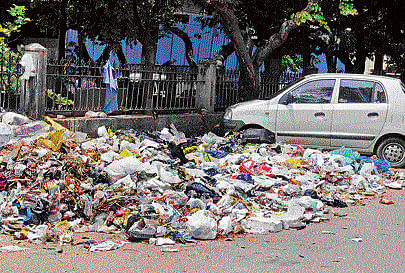
Continuous dumping of garbage in landfills will turn them into toxic emission site.
Toxic gases tend to envelope vast area via speeding winds, and changing landfill sites is no solution, scientists warned.
Organic waste, when dumped unscientifically, decomposes owing to the presence of anaerobic bacteria. Decomposition over a long time would generate gases that would gradually penetrate the surface and get absorbed deep under.
The gases are methane, carbon monoxide and carbon-dioxide which get accumulated inside the womb of the earth. The gases attain maturity after seven years of garbage accummulation on the landfill and undergoes chemical changes that make them poisonous. If these gases are not used to generate natural gas or bio-gas or fuel, they tend to heat up and emerge into air outside. The concentrated heat and emergence into air will be highly toxic, says environmentalist Yellappa Reddy.
When gases burst into air, controlling their spread is difficult. They tend to reach far flung areas depending on wind velocity. The solution is to convert them into fuels. By harnessing gas into fuel, you are not only making good use of gases, you are making money. Why can’t the government think of waste as money spinner and resource, wonders Reddy.
Bangalore has few waste recycling units at Yelahanka, Hoskote, Doddaballapur, Kanakapura. But only four units cannot process 4,000 tonne of garbage City generates everyday. The crisis at Mandur is direct fallout of shortage of recycling units. Sometimes waste has to be routed to Coimbatore which has large recycling plant. Salem too has one.
BBMP officials and corporators had visited the Salem plant, but no action has been forthcoming on new plant in City post the visit. Private companies like ITC have taken initiative to set up recycling plants as part of their corporate social responsibility. The strategy should be to compost and convert organic waste into manure that can be used to enhance greenery and vegetation. It becomes green resource that is not expensive and is locally available.
But the number of plants making compost and manure are low. There is recycling of plastic, paper, iron and steel by-products, cardboard packaging, broken furniture, egg shells, bottles, porcelain and sanitary wear.
There is enormous scope to make use of these in different forms — plastic being converted into form of wood. Europe has good technology to undertake this and private company has acquired the same for its recycling plant. There is no problem with solutions to handle garbage, with technologies widely available in Europe and USA which can be purchased by India.